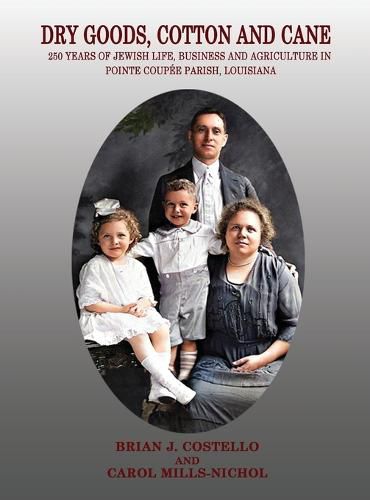Readings Newsletter
Become a Readings Member to make your shopping experience even easier.
Sign in or sign up for free!
You’re not far away from qualifying for FREE standard shipping within Australia
You’ve qualified for FREE standard shipping within Australia
The cart is loading…






This title is printed to order. This book may have been self-published. If so, we cannot guarantee the quality of the content. In the main most books will have gone through the editing process however some may not. We therefore suggest that you be aware of this before ordering this book. If in doubt check either the author or publisher’s details as we are unable to accept any returns unless they are faulty. Please contact us if you have any questions.
DRY GOODS, COTTON AND CANE: 250 YEARS OF JEWISH LIFE, BUSINESS AND AGRICULTURE IN POINTE COUPEE PARISH, LOUISIANA. With a record of permanent settlement since the 1720s, Pointe Coupee Parish is one of the oldest communities in the Mississippi River Valley. Creole in culture, owing to the predominance of its French, African, and blended ethnicities, the parish, however, owes much to its Jewish families, who once numbered in the hundreds and whose presence dated from the 1760s. In the wake of the Civil War, when the traditional plantation system collapsed, Jewish financiers, merchants, livestock dealers, and sugar and cotton brokers played prominent roles in shoring up Pointe Coupee’s war-torn economy. Jews were held in respect and friendship, and not infrequently married into the larger Gentile population. The earliest Jewish families in Pointe Coupee hailed from the Iberian Peninsula, via the Netherlands and the Caribbean. They were succeeded by successive waves of immigrants from France, the German states, and, at the turn of the 19th-20th centuries, from Austria-Hungary, Prussia, Romania and the Russian Empire. Their numbers were relatively small, but some communities had a particularly Jewish stamp, including the Lower Chenal of False River and Upper, or northern, Pointe Coupee. The Jewish people of Pointe Coupee Parish shared in the economic successes of their Gentile neighbors, and like them suffered from levee failures and disastrous floods, hurricanes, epidemics and crop failures. Most moved to better economic and educational opportunities in New Orleans and the cities of the American North and West. In the 21st century, the Jewish legacy lives on not only in local place names but in these immigrants’ dedication to local education and philanthropy, thereby providing a rich tile in the cultural mosaic that is Pointe Coupee Parish, Louisiana.
$9.00 standard shipping within Australia
FREE standard shipping within Australia for orders over $100.00
Express & International shipping calculated at checkout
This title is printed to order. This book may have been self-published. If so, we cannot guarantee the quality of the content. In the main most books will have gone through the editing process however some may not. We therefore suggest that you be aware of this before ordering this book. If in doubt check either the author or publisher’s details as we are unable to accept any returns unless they are faulty. Please contact us if you have any questions.
DRY GOODS, COTTON AND CANE: 250 YEARS OF JEWISH LIFE, BUSINESS AND AGRICULTURE IN POINTE COUPEE PARISH, LOUISIANA. With a record of permanent settlement since the 1720s, Pointe Coupee Parish is one of the oldest communities in the Mississippi River Valley. Creole in culture, owing to the predominance of its French, African, and blended ethnicities, the parish, however, owes much to its Jewish families, who once numbered in the hundreds and whose presence dated from the 1760s. In the wake of the Civil War, when the traditional plantation system collapsed, Jewish financiers, merchants, livestock dealers, and sugar and cotton brokers played prominent roles in shoring up Pointe Coupee’s war-torn economy. Jews were held in respect and friendship, and not infrequently married into the larger Gentile population. The earliest Jewish families in Pointe Coupee hailed from the Iberian Peninsula, via the Netherlands and the Caribbean. They were succeeded by successive waves of immigrants from France, the German states, and, at the turn of the 19th-20th centuries, from Austria-Hungary, Prussia, Romania and the Russian Empire. Their numbers were relatively small, but some communities had a particularly Jewish stamp, including the Lower Chenal of False River and Upper, or northern, Pointe Coupee. The Jewish people of Pointe Coupee Parish shared in the economic successes of their Gentile neighbors, and like them suffered from levee failures and disastrous floods, hurricanes, epidemics and crop failures. Most moved to better economic and educational opportunities in New Orleans and the cities of the American North and West. In the 21st century, the Jewish legacy lives on not only in local place names but in these immigrants’ dedication to local education and philanthropy, thereby providing a rich tile in the cultural mosaic that is Pointe Coupee Parish, Louisiana.